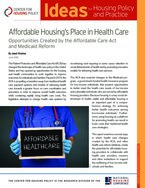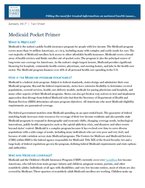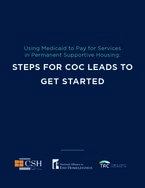Found 18 resources.
0
0
0
Adequate, safe, and affordable housing is one of our most basic needs. But in the US, access to housing is not guaranteed. Demand for affordable housing is growing, especially as housing costs increase beyond wage growth in many communities. Hospitals and health systems are stepping in to help fill this gap. Because of their mission orientation, the importance of stable housing on health outcomes, and policy changes initiated by the Affordable Care Act, hospitals and health systems are increasingly investing in and supporting the creation of affordable housing in their communities.
Topics: Affordable Care Act, Community development, Health, Housing, Low-income
 Shared by Housing Is
on Apr 25, 2019
Shared by Housing Is
on Apr 25, 2019 0
0
0

High-need, high-cost (HNHC) individuals are defined as people of all ages living with clinically complex needs and functional limitations who also incur high health care costs or are likely to do so in the near future. Despite frequent contact with the health care system and substantial medical spending, the physical, social, and behavioral health needs of these individuals often remain unmet due to uncoordinated and fragmented care. Studies suggest that HNHC individuals could benefit from a more holistic approach that coordinates the care they receive and addresses their unmet social needs....
Topics: Affordable Care Act, Disabilities, Health, Research, Seniors
 Shared by Housing Is
on Apr 11, 2019
Shared by Housing Is
on Apr 11, 2019 0
0
0
A key challenge for states in ensuring access to care for the 85.3 million Medicaid beneficiaries is having a sufficient number of providers. The Medicaid and CHIP Payment and Access Commission (MACPAC) recently found that higher Medicaid fees are associated with higher rates of physicians accepting new Medicaid patients. Even so, acceptance of new Medicaid patients differs across specialties.
Topics: Affordable Care Act, Health, Low-income, Medicaid / Medicare
0
0
0
In response to the heightened interest in the relationship between work and the health of individuals and communities, CMCS has clarified that Medicaid funds cannot be used to pay beneficiaries’ wages, but can pay for employment counseling as an optional benefit—to help people get jobs. Years of experience with work requirements for the Supplemental Nutrition Assistance Program, Aid to Families with Dependent Children, and populations with disabilities have developed the evidence for what is needed to help different populations find and keep jobs.
Topics: Affordable Care Act, Disabilities, Health, Legislation & Policy, Low-income, Medicaid / Medicare, Research, Stability, Workforce development
0
0
0
Health and reentry are closely related, and chronic medical, mental health, and substance use problems make it harder for newly released people to seek employment, obtain housing, and avoid reincarceration. Compared with the general population, justice-involved people tend to be in poorer health and need access to physical and behavioral health services, as well as the know-how and motivation to get care.
Topics: Affordable Care Act, Criminal justice, Health, Legislation & Policy, Low-income, Medicaid / Medicare, Research, Stability
0
0
0
The administration has proposed an expansion of the “public charge” rule that would make it more difficult for applicants whom officials deem likely to rely on public assistance to obtain lawful permanent residence (a “green card”) or a temporary visa. Among other changes, the rule would expand public charge determinations to include an applicant’s enrollment in the Medicaid program. Adding Medicaid to the list of public charge benefits that would be considered may force immigrants to choose between health insurance coverage and a future green card—with adverse consequences for parents and...
Topics: Affordable Care Act, Health, Housing, Immigrants, Legislation & Policy, Medicaid / Medicare, Safety
0
0
0
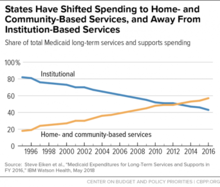
Some seniors and people with disabilities receiving home- and community-based services (HCBS) could lose their Medicaid eligibility and have to go into nursing homes to get needed care if Congress adjourns without extending “spousal impoverishment” protections that are set to expire on December 31.
Topics: Affordable Care Act, Disabilities, Legislation & Policy, Medicaid / Medicare, Seniors
0
0
0
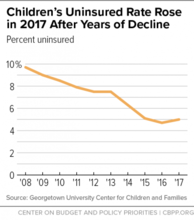
The uninsured rate among children rose in 2017 from 4.7 percent to 5 percent, a new report from Georgetown University’s Center for Children and Families finds — the first increase since Georgetown began producing this annual report a decade ago.
Topics: Affordable Care Act, Child welfare, Health, Low-income, Medicaid / Medicare, Research
0
0
0
The new opioid legislation—the Substance Use-Disorder Prevention That Promotes Opioid Recovery and Treatment for Patients and Communities Act (the SUPPORT Act)—signed into law on October 24 includes targeted expansions in treatment, including provisions that provide funding or flexibility to states to expand access to treatment for substance use disorders (SUD), including opioid use disorder (OUD), and health care more generally in Medicaid and Medicare.
Topics: Affordable Care Act, Health, Legislation & Policy, Low-income, Medicaid / Medicare, Safety, Substance abuse
0
0
0
Social determinants of health are the economic and social conditions that affect health outcomes and are the underlying, contributing factors of health inequities. Examples include housing, educational attainment, employment and the environment.
Topics: Affordable Care Act, Disabilities, Health, Homelessness, Housing, Low-income, Medicaid / Medicare, Mental health, Partnerships, Place-based, Substance abuse, Supportive housing
 Shared by Housing Is
on Aug 9, 2018
Shared by Housing Is
on Aug 9, 2018 0
0
0
Anthem’s affiliated health plans and other managed care organizations (MCOs) increasingly are helping Medicaid members who are diagnosed with mental health conditions and substance use disorders (MH/SUD) find stable housing, secure meaningful employment, and address a range of financial and daily life challenges.
Topics: Affordable Care Act, Cost effectiveness, Depression, Funding, Health, Housing, Medicaid / Medicare, Mental health, Nutrition, Substance abuse, Supportive housing, Workforce development
 Shared by Housing Is
on Jul 27, 2018
Shared by Housing Is
on Jul 27, 2018 0
0
0
On January 1, 2014, in states that have chosen to expand Medicaid eligibility under the Affordable Care Act, nearly all chronically homeless people who lacked health insurance became eligible for Medicaid. This Primer offers state Medicaid officials and other interested parties strategies for using Medicaid to meet the needs of this very vulnerable population--some strategies that have succeeded in the past and some that are emerging under provisions of the Affordable Care Act.
Topics: Affordable Care Act, Criminal justice, Disabilities, Dual-eligibles, Funding, Health, Homelessness, Housing, Low-income, Medicaid / Medicare, Mental health, Partnerships, Stability, Substance abuse, Supportive housing
 Shared by Housing Is
on Jul 27, 2018
Shared by Housing Is
on Jul 27, 2018 0
0
0
This report examines several ways in which health care changes created by the ACA, and other health care reform initiatives, create the potential for affordable housing providers to collaborate with health care providers, insurers, and other institutions to support the wellbeing of low-income individuals and families.
Topics: Affordable Care Act, Health, Homelessness, Housing, Legislation & Policy, Low-income, Medicaid / Medicare, Partnerships
 Shared by Housing Is
on Jul 20, 2018
Shared by Housing Is
on Jul 20, 2018 0
0
0
Medicaid is the nation’s public health insurance program for people with low income. The Medicaid program covers more than 70 million Americans, or 1 in 5, including many with complex and costly needs for care. The vast majority of Medicaid enrollees lack access to other affordable health insurance. Medicaid covers a broad array of health services and limits enrollee out-of-pocket costs. The program is also the principal source of long-term care coverage for Americans. As the nation’s single largest insurer, Medicaid provides significant financing for hospitals, community health centers,...
Topics: Affordable Care Act, Funding, Health, Legislation & Policy, Low-income, Medicaid / Medicare
 Shared by Housing Is
on Jul 17, 2018
Shared by Housing Is
on Jul 17, 2018 0
0
0
This guide is organized around five steps, each of which includes concrete ways to get started as well as links to additional resources. These five steps will help you build a case for why and how Medicaid can be structured at the state and local levels to pay for services in permanent supportive housing. When building a case you need to know some basics of Medicaid and the types of services you want Medicaid to cover. in order to convince Medicaid administrators and other health care payers to support your efforts, you need to have evidence of need for and impact of supportive housing and...
Topics: Affordable Care Act, Data sharing, Funding, Health, Homelessness, Medicaid / Medicare, Partnerships, Supportive housing
 Shared by Housing Is
on Jul 13, 2018
Shared by Housing Is
on Jul 13, 2018 0
0
0
A Toolkit for State Agencies
Topics: Affordable Care Act, Health, Legislation & Policy, Low-income, Medicaid / Medicare
 Shared by Housing Is
on Jul 13, 2018
Shared by Housing Is
on Jul 13, 2018 0
0
0
This brief provides an overview of current federal standards and state options in Medicaid to help inform upcoming debates about increasing state flexibility in the program as part of efforts to restructure Medicaid financing.
Topics: Affordable Care Act, Cost effectiveness, Funding, Health, Legislation & Policy, Low-income, Medicaid / Medicare
 Shared by Housing Is
on Jul 10, 2018
Shared by Housing Is
on Jul 10, 2018 0
0
0
Working Together to Meet Unmet Housing and Healthcare Needs
Topics: Affordable Care Act, Data sharing, Health, Homelessness, Housing, Low-income, Medicaid / Medicare, Mental health, Partnerships, Stability, Substance abuse, Supportive housing
 Shared by Housing Is
on Jul 10, 2018
Shared by Housing Is
on Jul 10, 2018 



